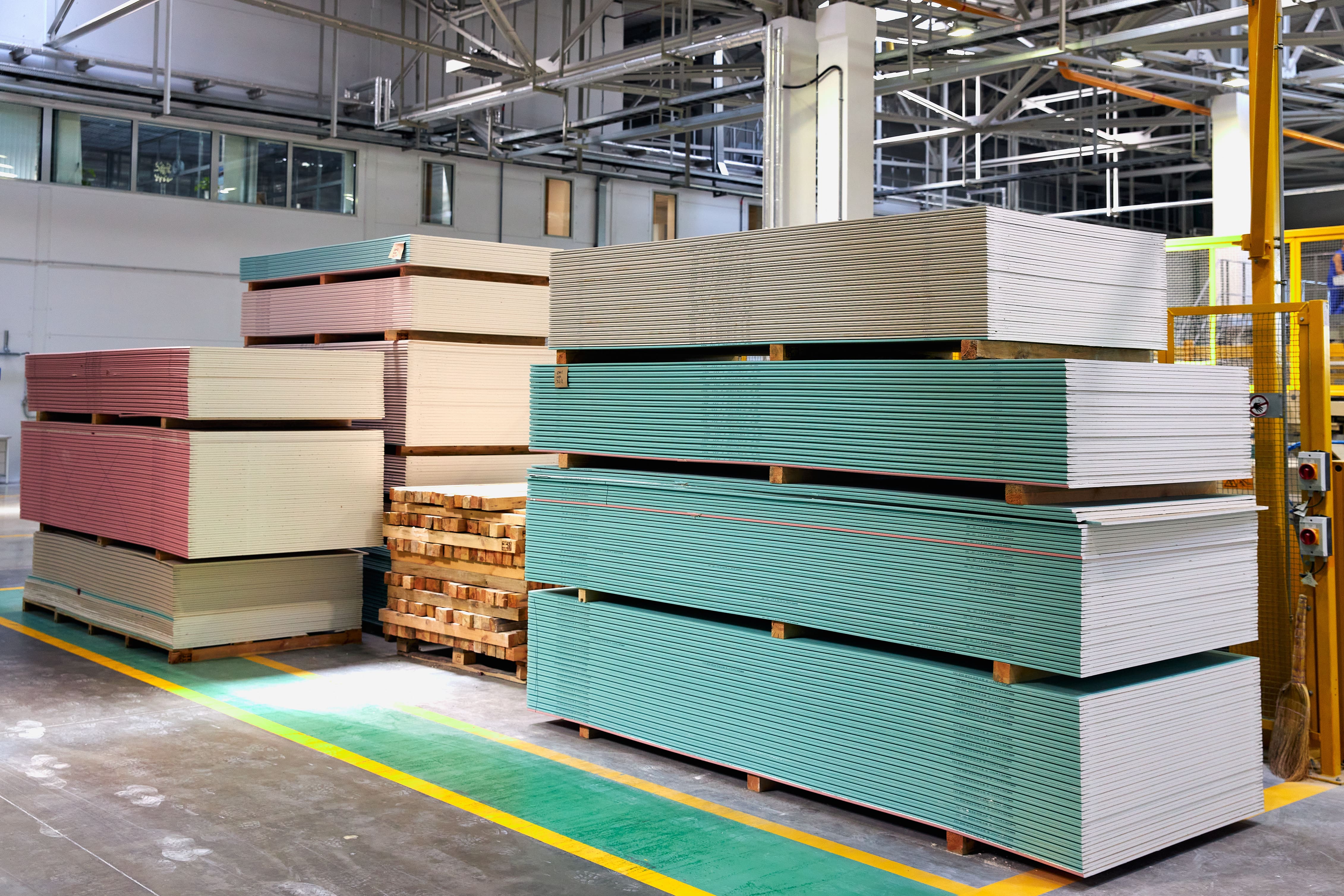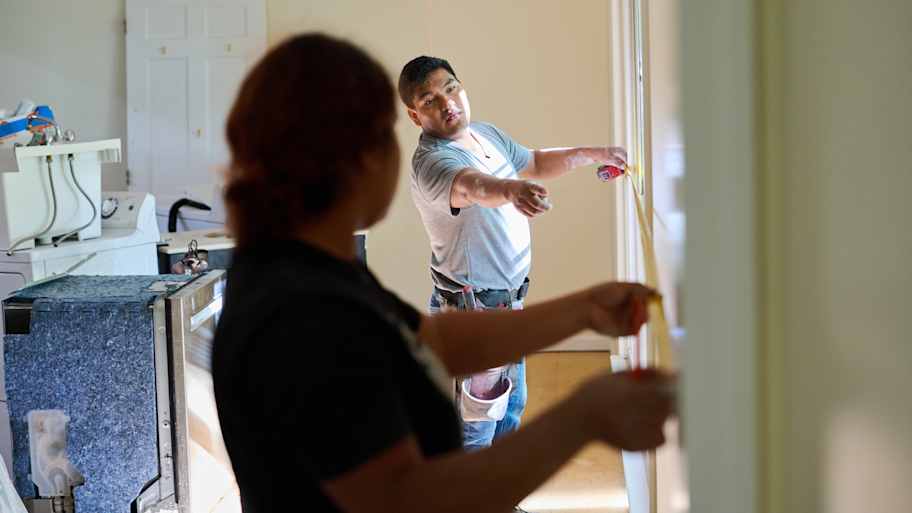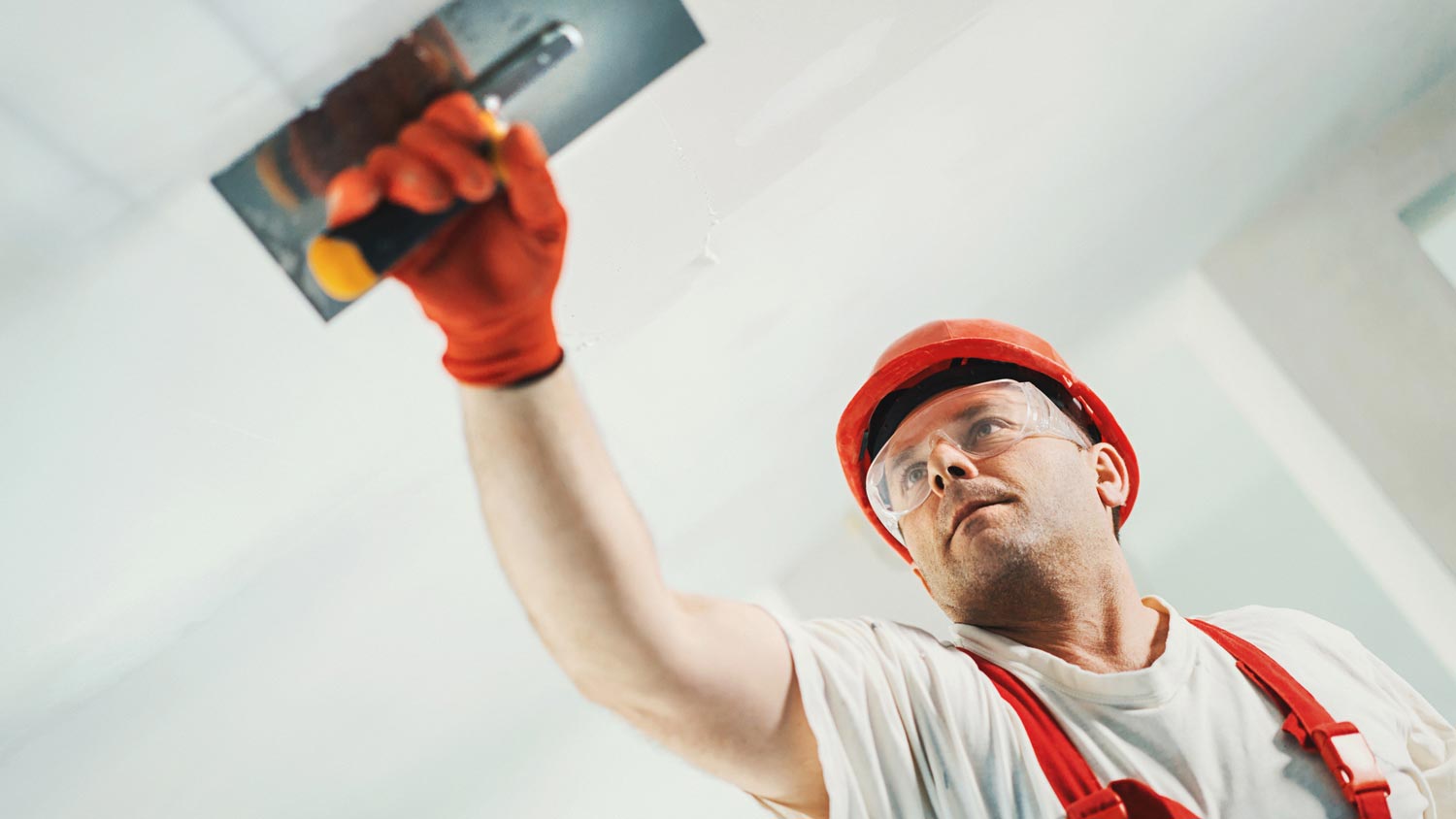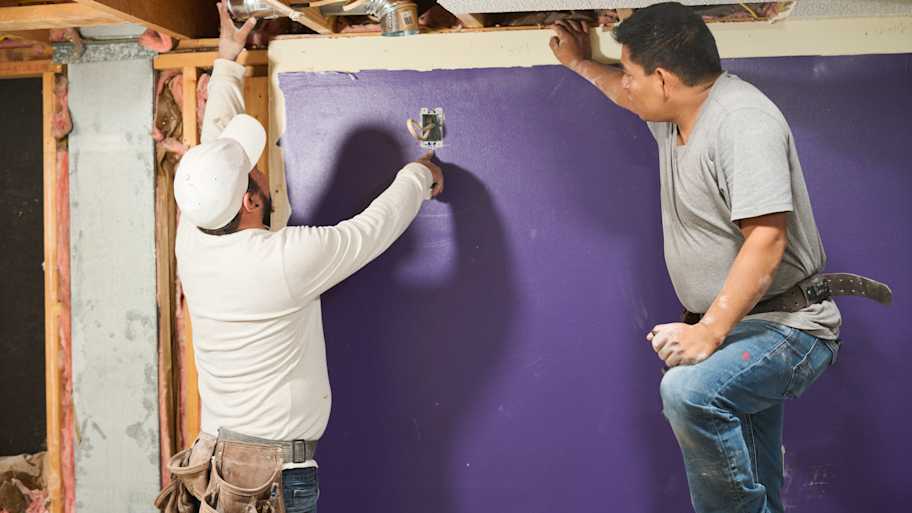Sheetrock vs. Drywall: What’s the Difference?
All Sheetrock is drywall, but not all drywall is Sheetrock


Drywall is a construction material used to cover the framing of interior walls and ceilings.
Sheetrock® is a type of drywall and is a trusted brand.
Sheetrock tends to be higher in quality, so it’s costlier than other types of drywall.
Drywall is a specific product that covers interior walls and ceilings in most homes. It consists of pressed gypsum sandwiched between two sheets of thick, durable paper. Meanwhile, Sheetrock is a high-quality brand of drywall. Contractors and homeowners alike use the terms drywall and Sheetrock interchangeably, as Sheetrock has become a household name.
In this guide, we’ll explain the differences between the two and help you decide which is best for your home improvement project.
Key Differences Between Sheetrock and Drywall
| Sheetrock | Drywall |
|---|---|
| All Sheetrock is drywall | Not all drywall is Sheetrock |
| Considered high quality | Ranges from low quality to high quality |
| Contains unique chemical compounds | Chemical composition varies |
| Made by the United States Gypsum Corporation (USG) | Manufactured by several companies |
Drywall and Sheetrock are often used interchangeably, and while it’s true that they have the same function, there are a few slight differences between the two to be aware of. Read on to learn about the difference between drywall and Sheetrock, and how to pick the best option for your project.
What Is Drywall?

Drywall is a construction material used to cover the studs of interior walls and ceilings. In the mid-20th century, it replaced plaster as the main building material in new home construction. Drywall is made by drying and compressing gypsum powder between thick paper. The gypsum gives the drywall stability and rigidity, and the paper provides a perfectly flat surface for paint.
Drywall is made from gypsum (calcium sulfate dihydrate) and is sometimes referred to as gypsum wallboard (GWB), wallboard, or plasterboard. It can contain additives to enhance its functionality.
As noted, the word “drywall” is also used synonymously with the term “Sheetrock,” a popular brand name—more on that below.
Drywall is used in commercial and residential construction and is the most common building material today due to its ease of installation, cost-effective price tag, and widespread availability.
There are various brands of drywall, and some have different properties, such as moisture-resistant drywall or mold-resistant drywall, to serve different purposes throughout the home.
All drywall is fire-resistant, but some brands of drywall have more fire-resistant properties than others.
Most types of drywall cost between $0.40 and $0.65 per square foot of material.
Drywall goes by many names, including plasterboard, wallboard, gypsum board, and Sheetrock, which is a specific brand of drywall. Regardless of which term contractors use, they're typically referring to standard drywall products.
What Is Sheetrock?

Think of the relationship of Sheetrock to drywall as you would the one between Band-Aids and bandages or Kleenex to tissues. Sheetrock is a brand name for drywall products, so all Sheetrock is drywall, but not all drywall carries the name Sheetrock. Due to its popularity, however, the terms have become synonymous.
Like drywall, Sheetrock can be used to construct walls and ceilings over the frame of a residential or commercial-use building.
Sheetrock is a tried-and-true brand and is trusted for many types of construction projects.
There are different types of Sheetrock drywall panels, and they have different features and properties to choose from. These include moisture resistance, flame-resistant coatings, and sound dampening.
Unlike other brands of drywall, Sheetrock doesn’t emit sulfur odors, which can cause a bad smell, could potentially lead to health problems, and can even corrode metals, like the screws contractors use to affix the panels to the studs.
Due to its popularity, variety, and quality, Sheetrock tends to cost more than other generic brands of drywall.
Different Types of Drywall and Sheetrock

Here are some different properties of generic drywall and the Sheetrock brand. For a more complete description of the different types of drywall available, refer to our types of drywall guide, but here are some key details:
Whiteboard: Whiteboard is the most common type of drywall available and is sometimes called “regular drywall.” Its most common use is in new home construction for walls and ceilings, and it comes in 4-by-8-foot sheet sizes, weighing around 50 pounds per panel.
Soundproof drywall: While all drywall or Sheetrock will provide some level of sound dampening, soundproof drywall adds another layer of control. Soundproof drywall is made with another inner layer of viscoelastic polymer to provide sound-dampening for rooms requiring more acoustic control, such as home theaters, bedrooms, home offices, or music rooms.
Ceiling drywall: Ceiling drywall—sometimes called sag-resistant drywall—is designed for ceiling panel installation. This option is lighter and less dense than regular drywall to prevent sagging and make it easier to install the drywall overhead.
Moisture- and mold-resistant drywall: Moisture- and mold-resistant products include green board and blue board. This type of drywall is ideal in areas that need to withstand moisture, like the bathroom and the kitchen. It’s made with a paper backing and coated with wax to repel moisture.
Fire-resistant drywall: Fire-resistant or fire-rated drywall is another specialized type of drywall or Sheetrock and is popular for use in basements, garages, or in areas near equipment or appliances that could cause a fire. This type of drywall works by reducing the spread of flame and smoke in the event of a fire.
If you hire a drywall contractor near you to install your drywall, they will help you determine which product suits your needs for the room. They will also ensure your drywall is up to code, which is essential in moisture-prone areas like bathrooms and kitchens and fire-prone areas like garages and boiler rooms.
Pros and Cons of Drywall
Whether you choose drywall or Sheetrock, there are some pros and cons to think about before starting your project.
Pros
DIY-friendly: Many drywall jobs are easy for DIYers to tackle, especially if they have the tools and skills.
Easy to repair: Damaged drywall? No problem. It’s faster, easier, and less expensive to repair or replace damaged sections of drywall than other building materials, like plaster or wood.
Paintable and coverable: You can customize Sheetrock and drywall by painting, wallpapering, and applying textures and finishes to fit your home’s decor.
Affordable: Drywall is reasonably affordable for most projects. While Sheetrock is more costly because of its brand name, it still fits within the budgets of many project planners.
Fire-resistant: Drywall is naturally fire-resistant, and you can buy types of drywall that offer even more protection.
Variety: If you need special capabilities, such as more fire protection, soundproofing, moistureproofing, or lightweight drywall, you have many choices.
Cons
Not waterproof or water-resistant: If you install drywall in the wrong place or it’s exposed to moisture, it can lead to mold, mildew, visible water damage, and crumbling.
Heavy: Drywall is made with a rock-like mineral, so it has some weight. That’s especially true if you use large-sized sheets. You may need special equipment or more than one person to handle large sheets or big jobs.
Dusty: Cutting drywall or Sheetrock generates a lot of dust. This dust can spread around the entire jobsite and make a big mess if the work area isn't separated with plastic sheeting or other barriers.
Toxicity: Most drywall is safe, but imported drywall can pose health risks, as can cutting old drywall that contains asbestos.
Eco-friendliness: Most removed drywall ends up in landfills, which can harm the environment. A study by the U.S. Environmental Protection Agency (EPA) showed how chemicals may leach out of drywall and into groundwater.
If the cons outweigh the pros in your case, you can find alternatives to drywall that may be better options.
Drywall Sizes
Whether you’re opting for the Sheetrock brand or a generic brand of drywall, they all will come in different thickness levels, and depending on the project you’re tackling, you may need a thicker type. The table below includes a list of the common drywall thickness levels that you can find at your local home improvement store or specialized retailer, along with the most common application of each.
| Thickness (in Inches) | Use Case |
|---|---|
| ¼ | Best for repairs of existing walls; suitable for curved walls |
| ⅜ | Suitable for some curved walls; good for repairs |
| ½ | Most common for walls |
| ⅝ | Reduced sagging is ideal for ceilings |
| ¾ | Best for sound-proofing |
The thinner the drywall, the more easily it will break and the less support it offers. However, all thicknesses have their own applications. Drywall that’s ¼ inch thick—the thinnest you’ll find—is good for bending around curved walls and for repairing existing damaged walls. Drywall at ⅜ inches thick used to be standard, but today, it’s most common for curved walls and repairs.
The ½ thick drywall is the modern standard for interior walls, while ⅝ inch thick drywall is more resistant to sagging and remains the standard for ceilings. Homeowners who want added protection from fire or superior soundproofing opt instead to install ¾ inch thick drywall on their interior walls and ceilings. This will drive up the cost, though, as thicker drywall costs more per sheet.
Drywall sheets are 4-by-8 feet. The 4-foot width is ideal for spanning evenly across four wall studs at 16 inches on center, or across three ceiling joists at 24 inches on center. The 8-foot length matches the standard 8-foot ceiling height in the U.S., which means you can minimize the need for cutting the drywall prior to installation.
It’s also possible to find sheets in the following dimensions for different applications:
2 feet by 2 feet for patches
4 feet by 10 feet for 10-foot walls
4 feet by 12 feet for 12-foot walls
This variety of sizes can simplify most jobs. First, figure out how much drywall you need. Then, determine if standard-sized sheets are the best fit for your project or if there is a better size for your needs.
Drywall vs. Sheetrock Installation Cost
Sheetrock is a high-quality brand of drywall, so it costs more than similar drywall products from other manufacturers. As such, your cost to install drywall will be higher, on average, if you choose products from Sheetrock. Standard drywall products cost around $0.50 per square foot for 4-by-8-foot sheets, while you’ll pay an average of $0.62 per square foot for Sheetrock-branded sheets.
Sheetrock is more expensive for a few reasons, but since it’s the largest and most popular drywall brand in the country, it’s clear that contractors and homeowners believe it’s worth the added investment.
It contains higher-quality materials
It comes in a wider variety of thicknesses
It’s manufactured in the U.S.
The products come in a variety of options for soundproofing, moisture resistance, and more





- 5 Types of Drywall and the Use Cases for Each One
- Everything You Need to Know About Drywall Thickness and Size Options
- What Is Drywall Made Of?
- Should You Glue Drywall? Learn the Pros and Cons of Drywall Adhesive
- Who Installs Drywall? Get the Right Pro for the Job
- Drywall Fire Ratings: Is It All Fire-Resistant? Here’s What to Know
- When Should You Hire a Pro for Drywall Repair vs. DIY?
- Lightweight vs. Standard Drywall: Which Is Better?
- How to Dispose of Drywall When You’re Done With a DIY
- 8 of the Most Common Drywall Problems and How to Solve Them











